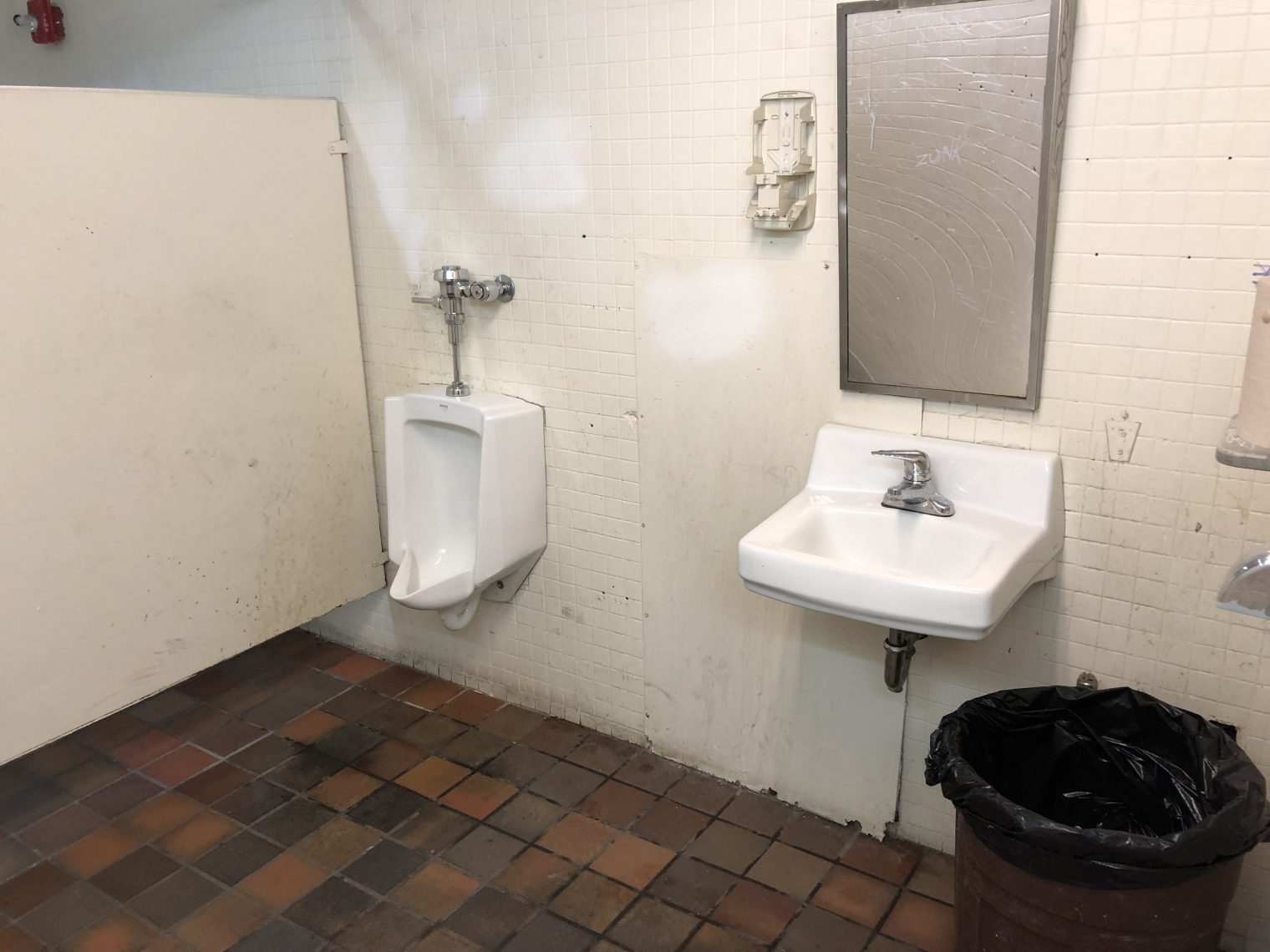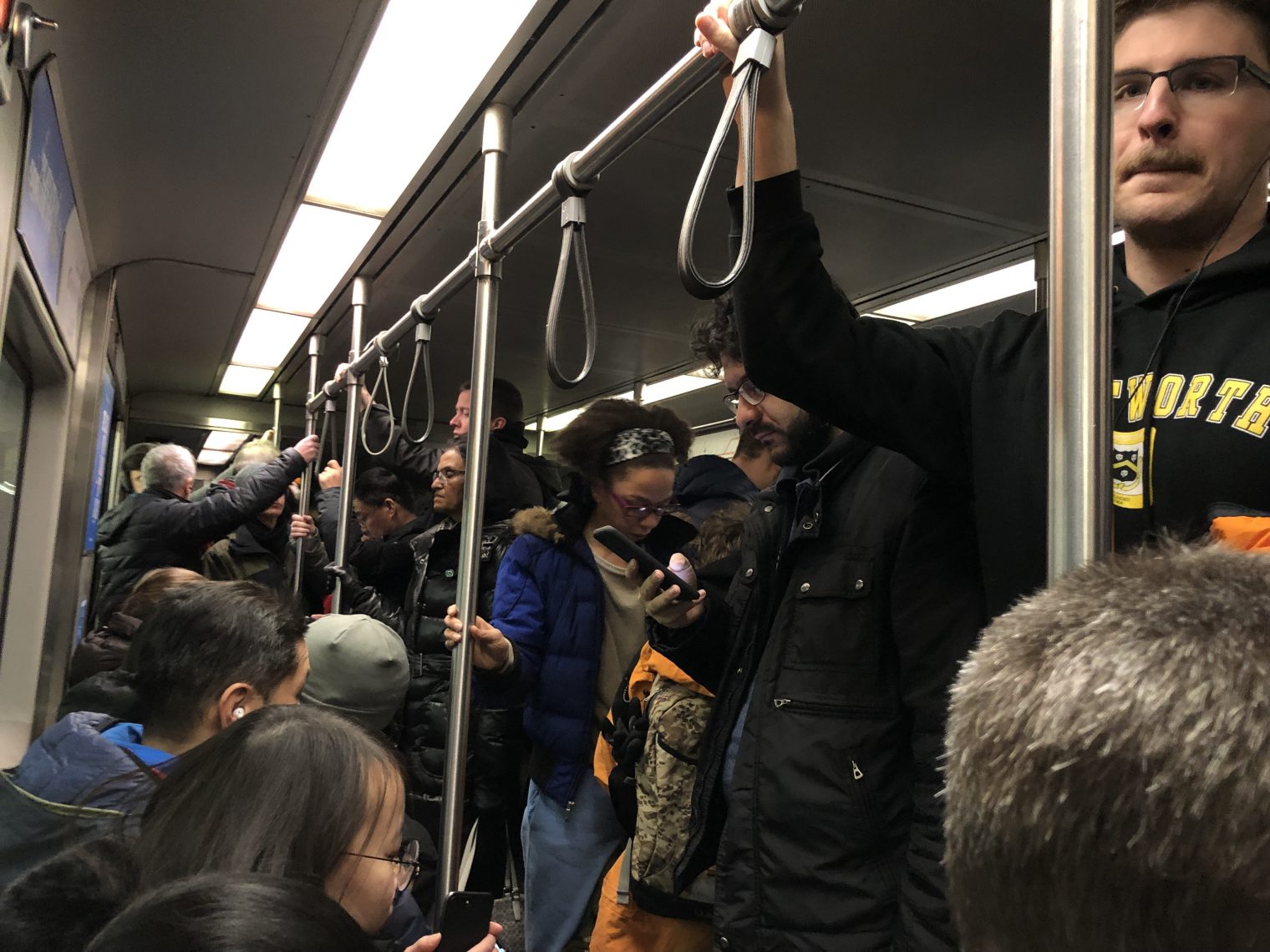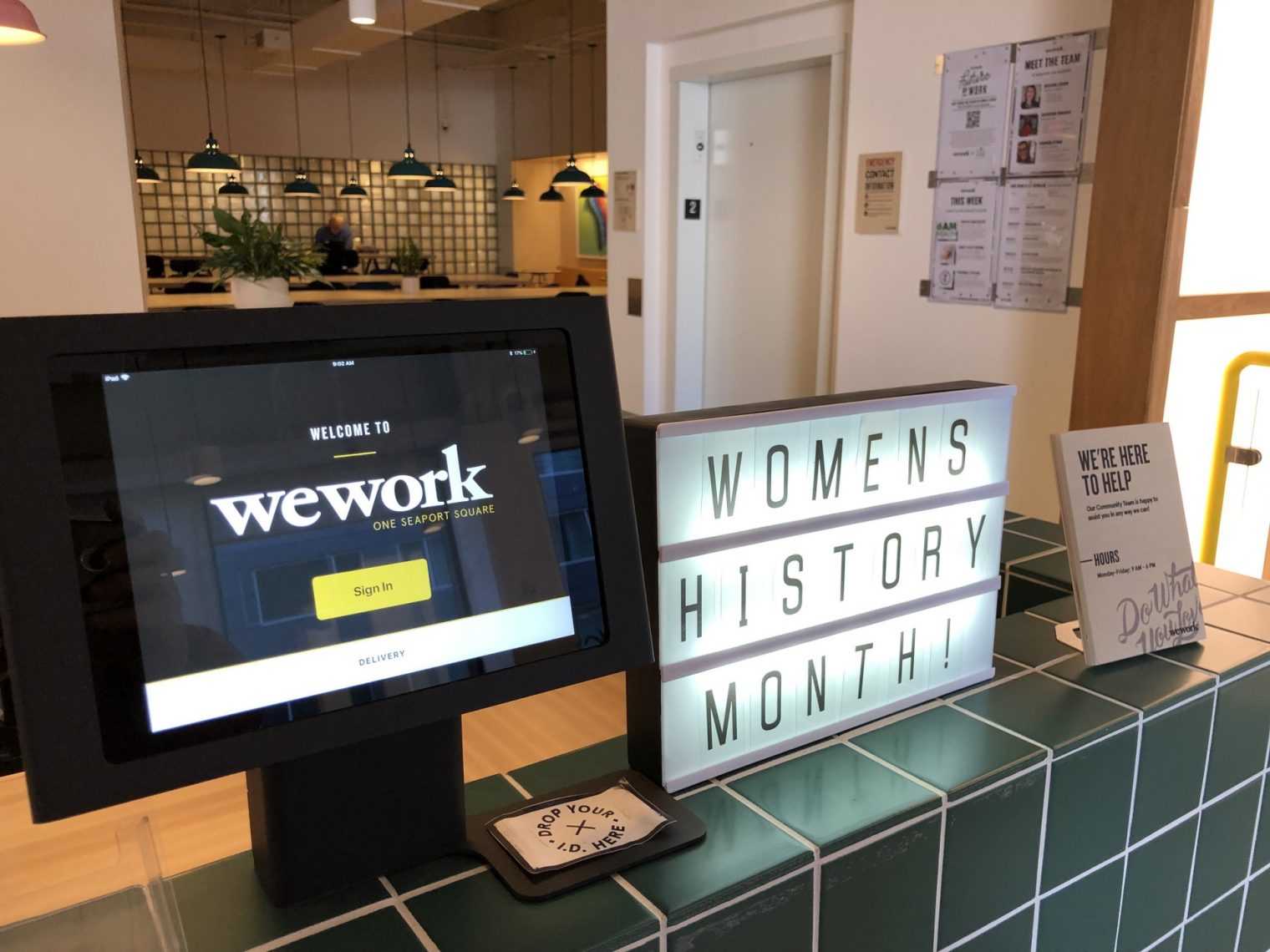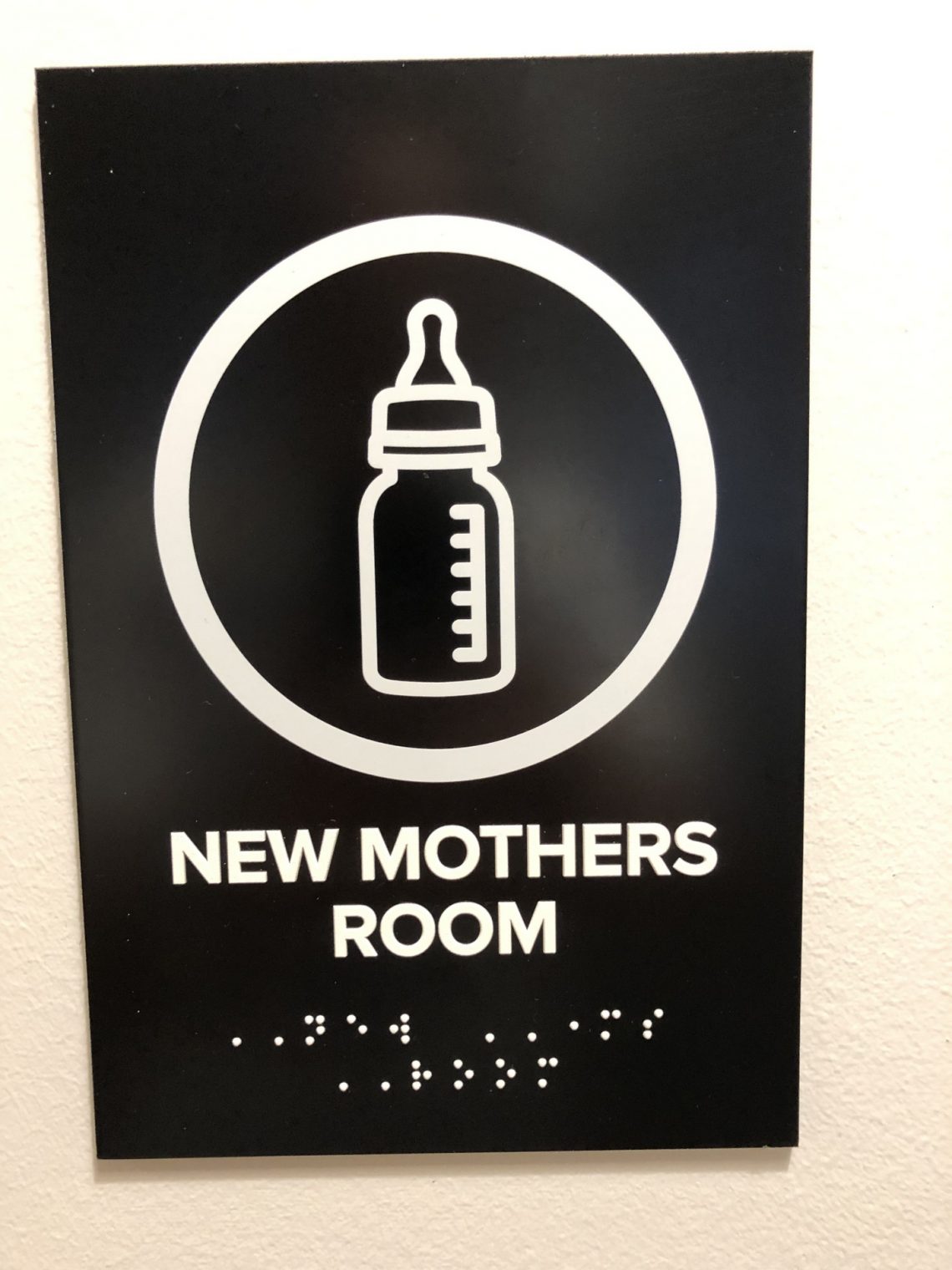The other day I had to be in downtown Boston for a 9:00 am meeting. Our road network melted down circa 2005 and there is no way to know if a 20-mile trip from the suburbs will take 45 minutes, 1.5 hours or longer.
I decided to do the 15-minute drive to the Alewife parking garage, which required about 40 minutes when started at 7:30 am. As there was no way to know how long the next phase of the journey would be and I was going to fortify myself with a Dunkins coffee (sold right in the station, unlike other transit systems that try to discourage eating/drinking), it seemed a prudent time to use the restroom in the massive building (replacement cost $200 million?):
Note that at least one plumbing fixture and the only soap dispenser are missing.
This is where the trains start so I was able to get on and find a seat. At the first stop, Davis Square, enough people got on to completely fill the car:
Nobody could get on at Porter, Harvard, or Central. Only after some biotech slaves go out to stream into the new towers of Kendall Square did the train have enough room to accommodate folks waiting on the platforms. (I later learned that the pro tip for those commuting in from Porter or Harvard is to head outbound to Alewife first and then come inbound.)
I made it to my destination on time and was wrapped in an atmosphere of comparative calm:
(Of course, I criticized them for their cisgender-normative prejudice in assuming that it is only “mothers” who might want to use a room for feeding babies. See “Breastfeeding as a trans dad: ‘A baby doesn’t know what your pronouns are’” (Guardian), for example.)
As the monopoly owner of the only means of reasonably fast and reasonably reliable transport between 7 am and 7:30 pm in the Boston area, I would expect that the MBTA’s financial condition would improve every year as the roads deteriorate. Shouldn’t they be able to extract huge $$ from desperate riders? If they want to preserve the low-cost-but-can’t-get-on-the-train option they can do that at the current fare ($2.25 or $2.75 depending on how it is paid for; see https://philip.greenspun.com/blog/2018/01/09/our-local-public-transit-system-spends-more-than-a-year-of-revenue-on-cash-registers/). But they could also run VIP trains in between that cost $10/ride.
Subjectively it seems as though the trains are packed to the point where they couldn’t get a single additional rider on. Yet, from November 2018: “T notes: Ridership, even at peak times on Red Line, continues to decline”. Maybe they are running fewer trains per hour?
Readers: How is it possible that a system that has an amazing irreplaceable paid-for-100-years-ago asset (the tunnels) can’t be profitable in an environment of ever-worsening surface traffic jams?
Related:
- “Public Statement on MBTA Ridership & Pension Costs” (Pioneer Institute): T ridership is down and pension costs are up. … The T (as opposed to its employees) is responsible for at least three quarters of pension costs. Under the best-case scenario, its contribution to the fund will rise from $74 million in 2015 to $112 million in 2022, a 51 percent increase. Actual 2022 costs could be as high as $137 million, which would represent an 85 percent rise over seven years. Despite spiraling employer contributions, unfunded liability has risen from $49 million to over $1 billion in a decade. [The standard MBTA system allowed a person to start working at age 18 and retire with a full inflation-adjusted taxpayer-guaranteed pension 23 years later, at age 41.]
- “RED TAPE: WHY THE RED LINE STOPPED SHORT” (Tufts Observer), explaining why the 1970s dream of the Red Line extending to 128 in Lexington was abandoned
- “How Hong Kong’s subway turns a $2 billion annual profit” (Money)
- “The 10 U.S. metro rail systems that lose the most money per passenger” (Brookings)





The similar pro tip works for sardine problems in San Francisco BART: ride in opposite direction, grab a seat and ride home.
The road network didn’t melt down on its own. It was deliberately sabotaged from the inside by anti-car activists who have completely seized control of the discipline of transportation planning, with support from politicians backed by the kind of people that make money from transportation boondoggles. Google “Induced demand” and/or “road diet” for the details in action.
There’s hope Elon Musk can save us by inventing a subway company which doesn’t have pensions. Doubt it can be done.
In Calif*, the trains fill up where the line begins & break down all the time if there isn’t police activity in Oakland or a medical emergency at Embarcadero.
Here’s someone who’s had the privilege of riding the T approximately 5x/week for the last 6 years (mostly Red line+Orange line):
The whole system has not been properly maintained for decades -> the trains, signals, etc break down all the time. The time you are supposed to wait for the next train is just unbelievable to anybody familiar with something like, for example, the subway in Saint-Petersburg, Russia – and that’s when nothing breaks down (when it does, you could easily wait for 30 min, including at stations such as Downtown Crossing, which can get overcrowded when the wait is 5 minutes). In order to have $10 VIP trains that people would be tempted to use, the T would have to become at least as reliable as Lyft/Uber, which would require such investments into the totally broken (both financially and structurally) MBTA that we’d be better off hoping for a brand new Boston Helicopter Commuter Service :-).
I read your blog now and I think I need a blood pressure monitor for my desk, because this is a blood-boiling nightmare and a disgrace. I watched the video on Hong Kong system. More than 5 million passengers a day, 99%+ on time rate, $2 billion a year profit, it’s clean, its’ well-maintained, it’s beautiful. What has happened to this country? Is there any way back? How can anyone in our society responsible for this level of publicly-funded wreckage not be in prison?
Are the people in Hong Kong that much smarter and better at running their society than we are? I’d like to think they aren’t, but if you keep doing these kinds of comparisons I don’t see how to avoid that conclusion.
The pensions are eating us alive. The retirees know it but don’t care. My old retired neighbors when they see me go to work like to tell me “enjoy your work! pay our pensions!”. I grit my teeth and smile.
The old have been enslaving the young since forever, but it’s going to reach a breaking point.
“The retirees know it but don’t care.”
What’s your suggestion – they volunteer to give up their pensions and live in poverty for their remaining days? Presumably they traded off wages or other benefits to get these contracted pensions.
This is a good argument for basic income I suppose.
I’m not sure it is as simple as pensions. https://cdn.mbta.com/sites/default/files/financials/budgets/fy19-itemized-budget.pdf shows that the MBTA spent about 10 percent of its budget on pensions and healthcare, plus another 1 percent on “health and welfare fund” and “other fringe [benefits]”.
The pension fund is underfunded by approximately $1 billion (see https://boston.cbslocal.com/2017/05/22/mbta-pension-fund-1b-shortfall/ ) so probably the pension spending should be increased by another 5 percent of total budget.
A 10-15 percent drain is bad, but the original post is questioning why they aren’t raking in crazy money given their monopoly position. Also, why should it cost a fortune to run given that the most expensive part was paid off 100 years ago.
This is the result that allowing a political organization run a public utility. We don’t do it with the power company or the Internet. We should not do it with the Subway. Pensions should not be twice or thrice in the private sector. It should not cost a billion dollars to fix a tunnel or rebuild a station. The fact that it does shows the level of corruption that is just astounding. Study after study must be done, 10’s maybe 100’s of millions just on studies. Consultants abound, each billing hundreds for their opinion. China can build a brand new convention center in a new town in 6 months with mass transit and Boston or New York can’t finish a subway project in 6 years. The real problem is that the original design of these structures was never designed to hold the number of riders or volume of trains they are supporting now. The landholders that would have to surrender space to grow the system refuse to cooperate. The roads don’t get fixed because we have to pay for private jails to punish drug offenders. They must try to continue to operate and make improvements as more and more people pass through them. An impossible job. Build new trains over the roads. Put people on those trains. Close lines underground, fix or expand them, and let it take less time. But an aesthetics consult will block that plan, or it will be racist, or it will unearth artifacts which have to be studied. Just move to the suburbs like they did in Detroit.
It’s definitely some type of systemic problem. Take the Washington DC area metrorail (subway) for example. I used to ride it in the early to late 80s. It was very reliable. I left and cane back for 8 months in 2008. Not only was it breaking down frequently, but they were periodically having train collisions and killing riders.
I like Glen’s suggestion to privatize subways and run them like regulated utilities. I’m skeptical of Elon Musk, but I think he’s got the right concept with his Boring Company.
Phil asks:
How is it possible that a system that has an amazing irreplaceable paid-for-100-years-ago asset (the tunnels) can’t be profitable in an environment of ever-worsening surface traffic jams?
The system IS profitable. If you had to ask, you just happen to be not one of those who profit from it.